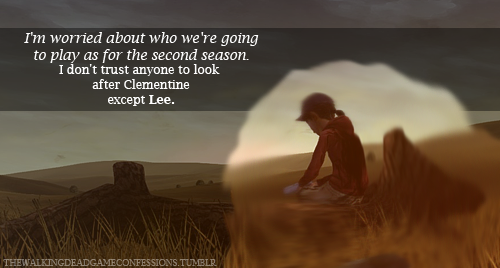TellTale’s The
Walking Dead is a good game. A great game, even. It’s won countless awards
and been Game of the Year for news outlets all around. From the
unusually specific “Best Digitally Distributed Game” to the generally
praiseworthy “Best Writing”, The Walking Dead has a gallery of trophies behind
it. It’s a good game and you
should play it. There’s no question nor article there. This is about why The
Walking Dead is an important game and you should invest in it.
Video Games are an
emerging art form. They are a mad experiment and anything is possible. You can
be a plumber who channels the power of big-balled raccoons to fight a dragon. You can be an outlaw exploring a
strange planet full of free guns. But you’re probably
going to be an underdog hero fighting a great evil in progressively difficult
scenarios until you’re inevitably triumphant. Also, you’re probably a White
Guy. Most of the time. Ya know.
Make no mistake, video
games are amazing and, in my mind, one of the greatest forms of self-expression,
when done properly. A huge problem overshadowing the industry is that there are
known patterns that will sell. Everyone wants to be the Next Big Thing and no
one wants to lose their investment. To this end, companies tend to stick to the
true and tested formula. This isn’t something that can truly be begrudged in
any sincere sense. The effects of it, however, are increasingly symptomatic of
art form unwilling to be artistic. Even slightest deviations, like acknowledging
women exist in a game, can be so uncomfortable that journalists will literally go out of their way to
actively hide this information.
So when I say that The
Walking Dead is an important game that you should buy, I am not just
recommending that you set aside time to enjoy a fun, quality game. I am asking
you to take part in one of the most effective cannon volleys yet made against
the stranglehold conventionality is gaining over a precious form.
Let’s break down some of
the most important aspects of the Second Season and why needs to be the best
selling game of December 2013 (A tall order, I know).
Morality:
Mature
Complexity in Story Telling
The concepts of good and
evil are relatively new to games. Ever since this, however, game companies have
sort have settled on this good/evil binary. Fable made the most sense,
contextually, when players could decide if they were the hero or villain of a
story. But that’s it. Mass Effect’s main thrust was how much control players
had over the story. It’s a great series and I strongly recommend anyone play
it, but it’s also true that most of the morality was “Hero” or “Hero that’s
pissed Starbucks burned her coffee”. Nothing summarized this as effectively as
the controversial finale to the series which, while having different thematic
implications, all resulted in the same cutscene. For goodness’s sake, the
original morality system of Bioshock was almost exclusively “Do you like to
brutally murder little girls that are victims of circumstance?” All phenomenal
games, but none pushing the envelope except in rare cases (Does this unit have
a soul?).
The Walking Dead’s first season changed this. The morality wasn’t as simple as “Good versus Evil”. You truly live in a world so overwhelmed in abstracts that “Does Good and Evil even exist anymore?” would barely merit a scene. Instead the game places you in the metaphorical role of a parent caring for their child in a world surrounded by symbols of terrible things that could happen. You are tasked, many times, with deciding what sort of example you’d want to set for your own children. More importantly, you are tasked with explaining why. Clementine, your ward in the first game and the playable character in the second, is deeply inquisitive in the most innocent of ways. When you make decisions, you have to justify yourself to her. Deciding whether a teammate “lives or dies” is a common question in games. What isn’t common is having to explain to Clementine that you just killed a good and decent person because he was a burden to the team. Or, conversely, that you let an incompetent person continue to harm Clementine’s friends “because he’s nice”.
Through deeper complex
moral systems, as well as scenes where we contemplate why we are making these
choices, we reach a new evolution in gaming. A moral system that goes beyond
the aesthetic encourages us to look at ourselves and determine who we are. It
helps us to connect with our own worldviews on a deeper level. It stays with
you. This is what art truly is: A means of communicating indirectly in order to
invoke direct connections with one another and ourselves.
There’s a time and a
place for binary moral decisions. They are always thrilling and interesting.
Complex decisions, however, as a means of causing introspection? That’s a new
form of digital life and it should be encouraged and protected.
For
Clementine: Representation Matters
More
than just the design of the game, the characters and stories in it are something
well worth supporting. Art influences public views. It permeates and colors our
views of the world. Even
at an early age, it affects our self-image and the limits we give ourselves. And video games,
dominated in representation by White Men, are only marginally accurate as to
the vast diversity of people out there. This is a problem. It’s a problem when
one of the only games to consistently have a playable, fleshed out People of
Color is Grand Theft Auto, a series about crime sprees. It’s a problem when Nintendo
has approximately two recurring female characters in their main roster, both of
whom exist primarily to be saved. It’s a problem when masculinity is glorified
and femininity equated with weakness that needs saving. And despite steps taken
by a wide variety of developers (shout outs to Mass Effect and Saints Row),
these issues still warrant addressing.
Enter
The Walking Dead: Season 2. Enter a game
about a Woman of Color (her exact race not specified) who is designed to invoke
empathy and compassion. It is necessity that one not only empathize with her,
but that they actively identify as her. Feel as she does and guide her/yourself
to safety.
When
Clementine first premiered, she was part of the TellTale gamble mostly because the
gamer stigma towards the dreaded Escort Mission. But gamers have embraced her. Massively
so, we are told. And to that end, she is being given her own series. If
successful, this can send a powerful message to developers and publishers that
they don’t need to be scared of who they put in games. They can put in People
of Color, women, children, and anyone else they want as a character. As long as
the game is good, it will work. As
long as the character is compelling, they will be loved. This message needs to
get out there. It needs to be circulated. And what better way than with the
success of a game that, even divorced from this, is good enough to warrant
support?
We Deserve Good Art
Large
name developers will, with few exceptions, make games that either reiterate the
norm or test said norm in controlled, small situations. A Triple-A title that
is truly divergent from expectations is few and far between. It’s
understandable, but you deserve better. We deserve better. Innovation and
experimentation. Evolution and representation. TellTale is in a unique position
to do just the sort of mad science that might just make larger companies sit up
and take notice. And with the game’s quality almost assured by developers with
a stellar track record, let’s make sure that’s exactly what happens.





No comments:
Post a Comment